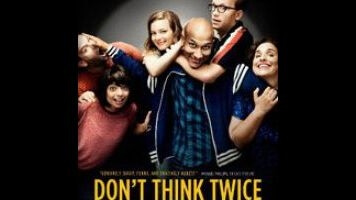For a time, scraping by in a big city doing improvisational sketch comedy seemed like the new scraping by in a big city playing in an indie rock band. (Younger people can chime in on whether anything has ascended to replace improv.) Yet while there have been plenty of movies about bands trying to make it big and a few about stand-up comics, Don’t Think Twice is the rare movie that’s immersed in improv as a subject, not a behind-the-scenes technique for goosing laughs. Mike Birbiglia’s film begins with such intense earnestness, providing a dash of wide-eyed historical background and the essential rules of long-form improvisation, that for a moment it comes across as a deadly attempt to explain the wonder of comedy to the squares. So it’s all the more impressive when it eventually reveals itself as a touching tribute to the form.
Anyone with experience performing or even attending improv shows will probably recognize the verisimilitude of the film’s performance footage of The Commune, a tight-knit group of comics and other creative types, and of their offstage interactions. Miles (Birbigilia), Jack (Keegan Michael-Key), Sam (Gillian Jacobs), Bill (Chris Gethard), Allison (Kate Micucci), and Lindsay (Tami Sagher) don’t just perform together; several of them live together, including the paired-off Jack and Sam. This lifestyle fits some of them better than others: Allison clearly receives support from her parents, while Miles is getting a little old to be bringing young women back to his dormlike room. Birbiglia uses a concisely cut montage to establish the day jobs most of the comedians have to hold down to support their comedy work. They’re beloved favorites at their local improv theater who also wait tables and deliver packages to pay the rent.
The more lucrative gig looming over all of the performers is a shot at Saturday Night Live, which here is called Weekend Live, but shares every single detail—from its opening credits to its photo-decorated hallways to its aloof producer/boss—with its obvious real-life source. Early in the film, members of The Commune get together to watch Weekend Live, even though they profess not to like it much; Birbiglia nails comic-snob critique when his character describes a sample sketch as “skillful but not funny.” Yet everyone in The Commune knows the show as the best possible exposure for a comic performer, and when two members are tapped for auditions, the potential career disparity creates rifts within the group.
Those rifts are mostly predictable but don’t always show up precisely at the expected time. When the lucky auditioners interrupt Bill sharing some bad news about a family member to let everyone know they’re up for Weekend Live, Bill isn’t even offended; he wants to know what bits they’re going to do in their audition. From this supportive, sometimes codependent environment, ambition and desperation still manage to emerge eventually, particularly from Commune founder Miles, who unsuccessfully went out for Weekend Live years ago and can’t understand why the show wouldn’t want “the teacher” of so many of its recent hires. Birbiglia is almost too convincing as a guru who never made it. Miles often doesn’t appear all that funny, even in the context of a semifailed comedian.
Some of the other performers are better-served than others; Micucci and Sagher have noticeably less to do. But collectively, Birbiglia’s character writing is spot-on about the way that being around funny people can be both exhausting and exhilarating. His sharp cutting slows down for the improv scenes, depicted in longer takes that are shot, crucially, from a camera floating around onstage, rather than from the audience vantage. The crowds, meanwhile, are only ever shot from the stage; Birbiglia never places the movie’s audience in the theater’s audience. He also devotes a few minutes early on to Jack and Sam off together, creating their own comedy world even during intimate moments. In another perfect detail, they constantly seem to be auditioning for each other.
Sam becomes a focal point of the story, and Jacobs does strong work as a gifted performer who starts to realize that she might love improvisation as a form more than as a potential stepping stone. Jacobs has less improv/sketch background than many of her costars, but she fits in perfectly during the performance scenes and anchors the movie in more serious moments—because Don’t Think Twice is as much a low-key drama as a comedy. It’s also a modest film, more sketch than detailed portrait. But amidst its hard truths about the odds of real success in a creative field, it’s surprisingly effective at communicating, through Jacobs especially, a kind of clear-eyed improv idealism.


 Keep scrolling for more great stories from A.V. Club.
Keep scrolling for more great stories from A.V. Club.